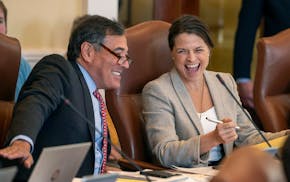A new House DFL tax plan would raise $2.6 billion by tapping high earners, smokers and, in the newest wrinkle, drinkers.
The plan would place a temporary surcharge on the wealthiest wage-earners, catapulting Minnesota's income tax rate to third-highest in the nation. At the same time, state taxes on beer, wine and hard liquor would double.
The alcohol tax, which hasn't risen in more than 20 years, would increase by 7 cents a beer, 47 cents per bottle of wine and $1.58 cents per bottle of hard liquor.
"Minnesota residents have paid the price for too long for irresponsibility budgeting," House Speaker Paul Thissen, DFL-Minneapolis, said in releasing the tax proposal on Monday. "It's time we turn the page on that past and look toward a stronger and more prosperous future."
The plan also includes a sales tax on sports memorabilia that could provide a crucial backup for the state's share of the new Minnesota Vikings stadium.
Democrats want to use the money to repay public school debt, boost property tax relief to homeowners and renters, and provide seed money for large-scale developments like the Mayo Clinic expansion in Rochester. The comprehensive tax overhaul package is designed to eliminate a $627 million projected budget deficit, but also would dramatically reshape funding for programs and initiatives Democrats staked out as election pledges.
While much of the proposal had dribbled out in recent weeks, the dramatic alcohol tax hike is a new component that is drawing furious criticism from Republicans. Democrats are looking to raise an additional $350 million every two years from a tax that hasn't been raised since the mid-1980s. As Thissen pointed out, for someone who drinks a beer a day, the new tax would cost about $25 a year.
House Republicans say the mashup of taxes goes far beyond the DFLers' campaign pledge to erase a state deficit by raising income taxes on the wealthy.
"I think Democrats in the House need to start a new reality TV show called Taxes Gone Wild," said state Rep. Greg Davids, a Preston Republican and former taxes committee chairman. "There's a tax increase for everybody, the rich, the middle income, the poorest of the poor. It's an outrageous proposal."
House DFLers would raise income on the top 1.1 percent of the state's taxpayers. For married couples that would kick in at taxable income above $400,000. That's a scaled-down version of DFL Gov. Mark Dayton's plan, which would raise income taxes for the top 2 percent of wage-earners.
But House DFLers would tack on a two-year, 4 percent income tax surcharge on taxable income above $500,000 a year. Revenues from the surcharge would help pay off the remaining $808 million the state borrowed from public schools and would allow the state to offer tax breaks to businesses for new equipment purchases. Dayton and Senate Democrats have not embraced the House tax plan, but Thissen said he believes most Minnesotans will support it.
The proposal includes direct property tax relief for 1 million homeowners and renters, along with money to help the city of Rochester with a massive, 20-year expansion of the Mayo Clinic. The House also sets aside money to aid expansions of 3M's Maplewood campus and the Mall of America.
Sin taxes would go up
The proposal raises nearly $790 million from the so-called sin taxes.
Cigarettes would go up $1.60 per pack, taking total taxes to $2.83 for a pack of cigarettes.
"There is overwhelming evidence that tobacco and alcohol consumption cost the state billions of dollars," Thissen said. "These user taxes will allow the state to recover some of those costs."
The House proposal carves out a tax credit for small craft brewers that produce less than 200,000 gallons a year and wineries that produce less than 100,000 gallons a year.
Rural Republican legislators said the alcohol and tobacco taxes would land too heavily on low-income Minnesotans.
"What a shock, what a slap in the face of the working class and the working poor," said state Rep. Mary Franson, R-Alexandria. "That's not high earners at all."
Rep. Pat Garofalo said this is proof the Democrats are not able to control spending. "This is why you don't let the Democrats have total control over the state of Minnesota," said Garofalo, R-Farmington. "There's no adult supervision to stop these crazy things."
The fight over taxing raged as outside activist groups from both sides took to the Capitol and the airwaves to make their case, giving the tax fight a distinct campaign-season flavor.
Spending fell over 10 years
At a Capitol news conference, representatives from Minnesota 2020 issued a report saying that adjusted state government spending is down more than 18 percent from a decade ago. The group is pressing legislators to adopt the proposed tax hikes, saying state spending would still be below historical averages.
"Despite the fact that conservative pundits say that spending is out of control, what they ignore are the facts," said Matt Entenza, a founder and board member of Minnesota 2020 and former legislator.
The Minnesota 2020 report, called Crumbling Fiscal Foundation, says per capita state government spending is now at historic lows of less than $3,100 per person.
"Minnesotans deserve a better deal and the state deserves a better deal," Entenza said.
Meanwhile, a business group called United for Jobs released a second television ad featuring Minnesota business owners expressing concern over the proposed tax hikes.
Dave Baker, of Baker Hospitalities, Loren Corle of RELCO and Rob Holt of Super Radiator Coils said in the ad that the tax hikes would make it harder for them to hire new employees and expand their businesses.
"We hope the governor and legislators will consider the real Minnesotans they would be hurting before they raise taxes," they said. "We can do better."
Baird Helgeson • 651-925-5044
The Latest | A second seated juror is dismissed from Trump's hush money trial

Biden scores endorsements from Kennedy family, looking to shore up support against Trump and RFK Jr.

